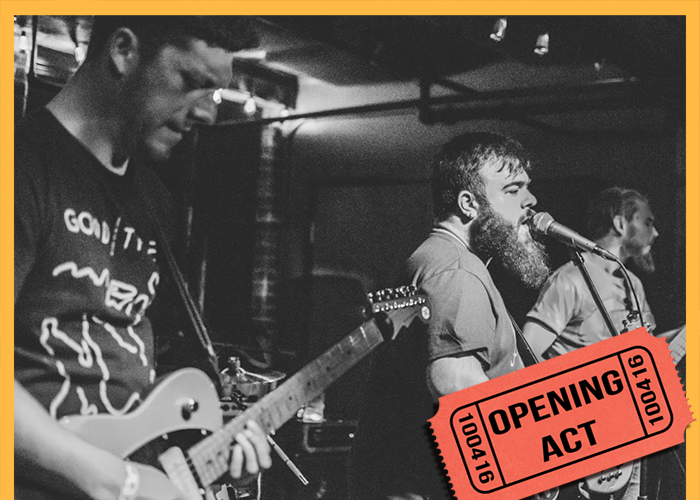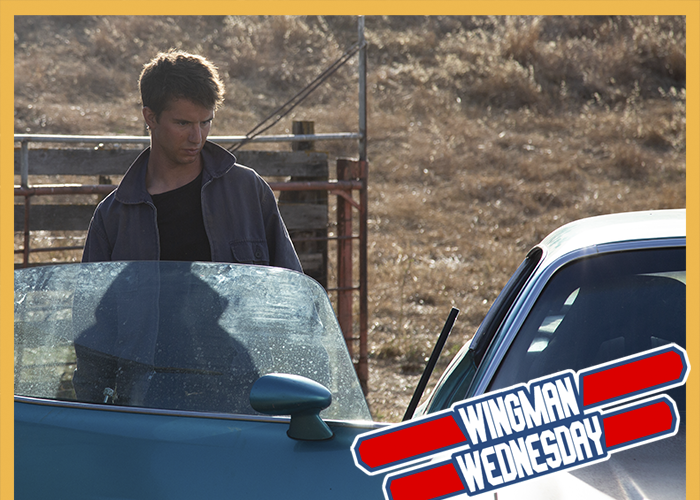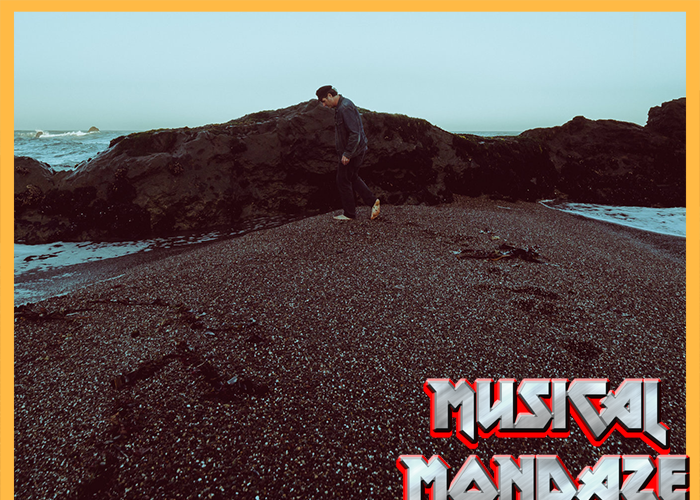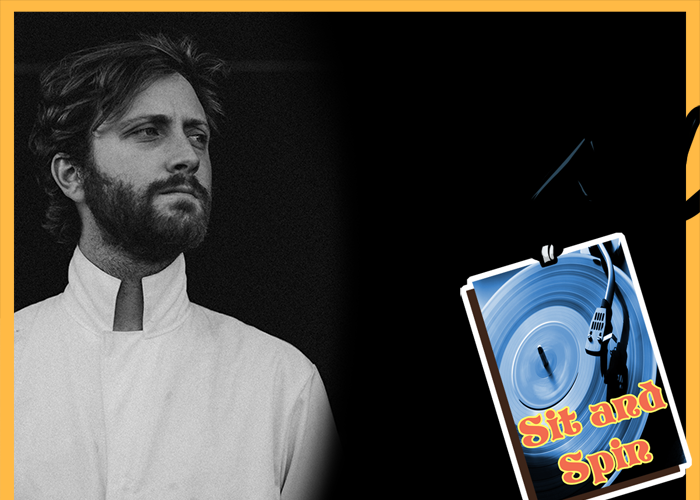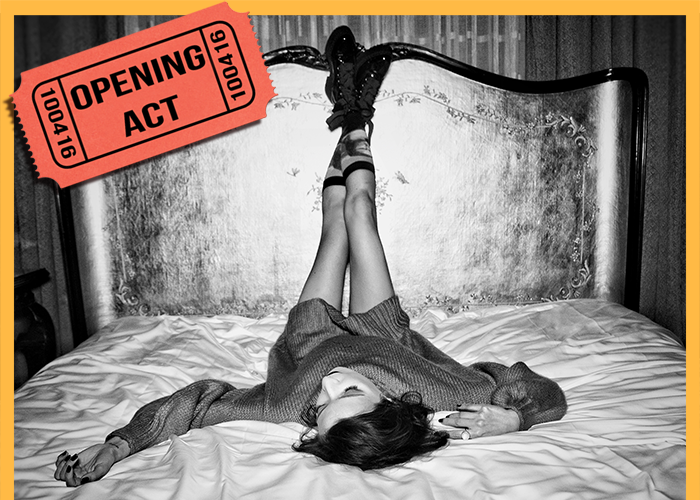After a brief summer break, TrunkSpace is returning from its YAYcation with all new daily content beginning on Thursday, August 5th! See you in a few short days!
July 2019

With two shows currently airing – “Good Trouble” on Freeform and “Yellowstone” on Paramount Network – Denim Richards is living out his boyhood dream, but he’s quick to point out the importance of maintaining a balance between professional fulfillment and emotional security, something that is easy to lose sight of when you’re constantly working.
“I think for me, I appreciate this run, but at the same time, I’m also still very much thinking about myself and my emotional health and my mental health and making sure that I’m not getting wrapped up in that and just constantly working on it,” he said in an exclusive interview with TrunkSpace.
We recently sat down with Richards to discuss the changing Hollywood landscape, returning to a character after an extended break, and why actors should never believe their own press.
TrunkSpace: You grew up wanting to be in the industry, so what does it feel like to currently have two shows on the air?
Richards: Oh man, it’s pretty much the biggest blessing. I think it’s something that, when I was younger, I always imagined myself doing this type of work. Obviously, I’ve always wanted it to be as an actor, I just didn’t know how it was going to happen necessarily. I didn’t grow up in a family full of artists. They were all educators, so super logical, and then I came around, super not logical at all, and very emotionally driven. So, I went through many, many years of just going the theater route – doing musical theater and stuff like that – and just waiting and waiting. And I just feel very blessed to finally have broken through in the last couple of years and to be able to do what I’m doing now. And obviously being able to have two shows on back-to-back nights, it’s like a dream come true because there’s people that have worked their entire careers and haven’t been able to do that. So, I just feel so blessed and humbled having the opportunity to be in this position right now.
TrunkSpace: Do you feel like that kind of opportunity is something that is new to the current age of television? If we looked back 10 or 15 years ago, you didn’t see an actor working multiple television projects at the same time.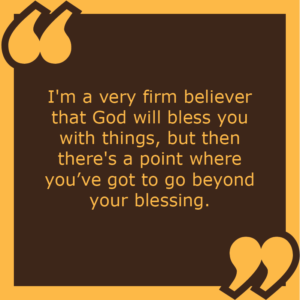
Richards: Yeah, I think Hollywood has shifted so much now with the medium as far as how entertainment is perceived. Like you were saying, 10 or 15 years ago, if there was a big-time type actor that was on a TV show, he was the number one on the TV show, and then after that, he was just doing films. But now, films aren’t as profitable as they used to be, just because of Netflix and Amazon, and so now I think that there’s been a shift back to where you can make the same type of money doing television as you can doing films, as well as also not having to necessarily go away for six, seven, eight months out of the year to go work on a project that won’t come out for two years.
And especially in this day and age, with my generation, if you have a project and you have to go away for eight months, it’s like you might as well not exist anymore. (Laughter) It’s a weird thing being able to balance, but it’s definitely shifted. And I think that, just as artists, now we have a great opportunity to be able to constantly exercise those muscles, instead of just doing one project and then waiting the entire year for that same project to come back around.
TrunkSpace: As a creative person, and if you have a storyteller’s brain, there’s got to be something really interesting about being able to see that through long-term. You recently got upped to series regular on “Yellowstone” for which a congratulations is due, but that must be exciting to be able to come back after a period of time and see where your character is going?
Richards: Oh man, yeah. One of the best things about this is that – because art imitates life and vice versa – you have the opportunity to take a break with the character and grow as yourself through life experiences, and then be able to come back and see your character as well as yourself in a different light, and add whatever personal experiences that you’ve had throughout your year. And then, being able to kind of infuse some of those experiences into your character, I think it is very enriching. As artists, you need to go out and have experiences in life that are outside of your art, otherwise your character’s never going to grow. So that’s kind of important, that we’re constantly challenging ourselves. There definitely is a lot of benefit of being able to have six to eight months off and then being able to come back to it.
Obviously the goal, 100 percent, is always to come back. (Laughter)
TrunkSpace: Have there been moments where you’ve been working in a scene and you’re trying to tap into the character, and you do find yourself thinking back to something that happened in your own life and relating in a way that you may not have been able to if you didn’t experience what you had?
Richards: Yeah. There’s definitely been some moments where you infuse certain experiences that you’ve had in your life with a character. You haven’t gone through everything, but I think emotionally you can relate to certain things and infuse those personal experiences with those characters. There’s a couple of times on one of the projects that I did a couple of years ago, “The Chickasaw Rancher,” where it was this back-against-the-wall type of thing, but isolated. And obviously for me, I had never grown up in the 1860s in Sulphur, Oklahoma, but I could remember going back and just having childhood memories of feeling isolated and feeling maybe that people didn’t really get me and didn’t really understand me. So, I was drawing on those experiences. Not using that as the forefront – that’s not your entire thing – but it’s definitely an ingredient that you lay down, because I think that you have to be very careful with trying to force an emotion.
When you’re younger… and when I say younger, I mean early 20s, you’re kind of… I won’t speak for every artist, but you’re so desperate to show people that you’re acting in a way, that you’re able to convey these emotions, and so you end up kind of forcing these emotions. So then when it comes out on screen, it doesn’t look organic. And so I think that a lot of it is just having all these different ingredients, and then allowing it to simmer, and then just letting it go and allowing whatever you’re feeling at the time… just trusting that and allow the camera to pick up everything else.

TrunkSpace: What would 10-year-old Denim think of the work that you’re doing now?
Richards: I don’t know. I think that he would probably be shocked. I think that when you’re younger you always imagine that you want to do something but you don’t necessarily know what doing it is going to actually be. You just think that you’ll just show up on screen and then that’s what you’re doing. But there’s so much other work that goes into it. But I definitely can say, from people that I’ve even grown up with that have known me for my entire life and have always known that I wanted to be an artist and I wanted to be an actor, a lot of them are fairly surprised of how all this has gone down. I wouldn’t necessarily say that I’m surprised. I think that I just feel very humbled by it and by the work and by the opportunity. And because of the creators of these shows – with “Good Trouble” and as well with “Yellowstone” – the creators of the shows really have allowed me to be able to just take hold of the characters and just do what I want with them and make them organic. And it’s very rare that you get to get on these types of projects where the characters are not already made for you. I feel very blessed to be a part of this where you really get to feel like an artist and just create however you’re feeling with the characters and that the creators trust you with that vision. I think that’s amazing.
TrunkSpace: With this run that you’re on, is it part of that old adage of work begets work? Did one project lead to the other and so on and so forth?
Richards: I would like to think that, but in the interim there’s a hundred auditions that I didn’t get. So, I would like to take the, “Yeah, I just did this, and then every other one that I get will be equally the same,” but I think a lot of it is just patience. I think that one thing that Hollywood will always do or entertainment will always do is they will keep you humble. You’ll get on these highs and then you’ll take a break and you’ll go on hiatus and maybe go out and audition for another project and then you won’t get it. And it’s like, “Damn!” So, it’s so much of a patience game. And I think that acting is about 10 percent of what we do and 90 percent is working on your mental and emotional and spiritual health and making sure that’s good. Because I think you have to be very careful about not allowing your artistry to define your existence. And I think that if you do this for a long enough time, if you’re doing multiple shows or doing a show and a movie and you’re working nine to 10 months out of the year and you string a couple of those years together, you start to feel like you’re defined by your work.
And so I think that if you’re not careful, you can get lost in that and then that can become very dangerous, especially if there’s a year or two where you’re just not doing anything. So I think for me, I appreciate this run, but at the same time, I’m also still very much thinking about myself and my emotional health and my mental health and making sure that I’m not getting wrapped up in that and just constantly working on it. I think that that is the old adage of not reading your own press, and I think that’s the part that keeps you humble… or should.
TrunkSpace: So how do you balance that with feeling successful in the industry then? How do you define the success and at what point can you let your guard down a little and just enjoy it?
Richards: Yeah, and I ask myself that crushing question daily. “When is there a moment where you just appreciate all of it?” And I think that I do. I definitely appreciate it now because three years ago I had –$66.00 in my bank account. So, I definitely appreciate not having -$66.00 in my bank account and an empty refrigerator – 100 percent. I’m a very firm believer that God will bless you with things, but then there’s a point where you’ve got to go beyond your blessing. And so it’s this moment where you appreciate where you are, but then you also keep going. It’s not the end, because as long as you have air, you know you have to keep going.
“Good Trouble” airs Tuesdays on Freeform.
“Yellowstone” airs Wednesdays on Paramount Network.
 Artist: Junro
Artist: Junro
Hometown: Southern New England
Members: Justin Wotus (lead guitar), Dave Nelson (vocals/rhythm guitar), Matt Levesque (drums), Dan Roellke (bass)
TrunkSpace: Can a city or region impact a band and their sound, and if so, how have your New England roots influenced Junro?
Roellke: I think it can, for sure. I think that the northeast has some great musical influences. With Berklee College of Music being in Boston and with NYC being so close to CT where most of our band members live, we’re surrounded by talent. There are so many great New England-based bands out there that keep setting the bar higher for Junro with every new thing we try to do. It’s exciting and we’re all super happy to be part of it.
TrunkSpace: You recently released your sophomore album “From Hell.” For first-time listeners, what would they learn about the band in sitting down to listen to it in its entirety?
Roellke: For a first-time listener, I think what would immediately jump out is how unique yet familiar the overall sound is. We all grew up in the ‘90s which was arguably one the best times for rock music. That coupled with each band member’s range of musical influences and experience, “From Hell” showcases that. It’s accessible for the average music consumer, yet there’s also something to chew on for the technical music lovers.
TrunkSpace: We’ve heard a number of bands talk about the post-studio doldrums that set in after they finish up a record. Did you experience any of that when you called wrap on “From Hell” and how do you channel that creative energy when the recording process is done?
Roellke: In my opinion, the “post-studio doldrums” are iterative. After releasing the album, it had been received SUPER well and it was very exciting getting all the positive feedback. However, the doldrums really come when we play a show that doesn’t turn out as expected. We play some great shows and we feel that we’re on top of the world, and then we play some that are not-so-great and make us question our existence. (Laughter) So, it has been a fun cycle of feeling like kings, followed by self-loathing, rinse, repeat. But overall, we love it and all of it motivates us to make that next release or next show the best one yet.
TrunkSpace: The world seems to have ADD when it comes to focusing on any one thing these days. We have become a short attention span society. Is it daunting putting an album out into the – something you put so much of yourself into – and then having to cut through the noise to bring the eyes and ears to the table?
Roellke: It can be daunting, for sure. However, based on our last two releases, we have a decent idea on what markets to target for our sound. Obviously, our sound will cut through the noise for some folks more than others and we work hard to make sure we bring the people who would love it to the table through targeting.
TrunkSpace: What would your 13-year-old self think of “From Hell” and your musical journey as an adult thus far?
Roellke: I think “From Hell” is catchy enough to keep my 13-year-old self interested. I think there is also enough interesting musical parts on the record that would inspire me to be a better player. I started playing guitar for the first time right around that age, so I would be trying to figure out the songs and better my ability. We find that the majority of those who like our music are also musicians themselves which makes us all proud. At 13, I never thought I would be playing original music on stage, yet we all have that dream, right? I think we are far from living that “dream” per se but I think some of the things we’ve done would be impressive to a 13-year-old in the early 2000s. (Laughter)
TrunkSpace: What are you most proud of with the album?
Roellke: I am most proud of how well it was received. When we first put out our first record, “Throwing Stones,” people liked it, but we also got our share of typical social media trolls dolling out hate for the sound. This time around with “From Hell” we only got some hate from maybe two people? So it’s something we are proud of for sure. It’s a great feeling to put out something unique and your own and have people love it.
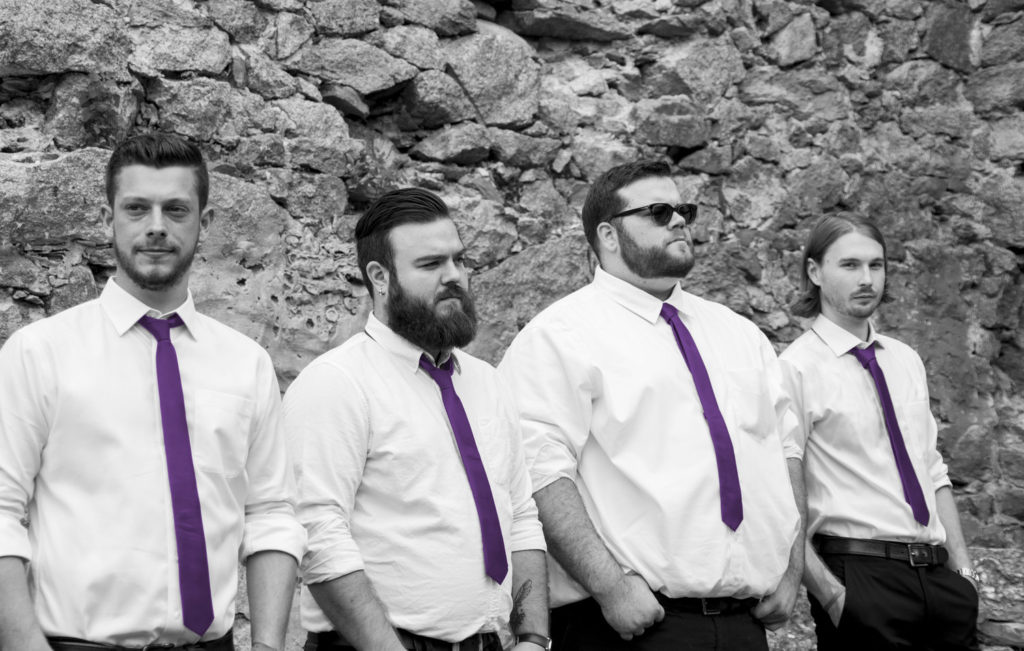
TrunkSpace: What do you get out of being in a band, and Junro in particular, that you can’t achieve as a solo artist. Does the creativity of the rest of the group inspire your own creativity?
Roellke: What I love about being in Junro is how it has forced me to step outside of my comfort zone musically. It’s forced me to be a better player. It’s really made me think outside the box. Junro’s sound is definitely a sum of its parts and I don’t think any of us would produce something as unique as solo artists. Being surrounded by these great players really inspire me to come up with musical ideas I would never have, and I think we all feed off of each other’s creativity.
TrunkSpace: Has there been a moment where you’ve considered walking away from music, and if so, what kept you on the current path you’re on?
Roellke: Totally. Alluding back to the “post-studio doldrums” comment, sometimes, at least for me, I question our existence. I feel like every artist has those feelings at least once in a while. We all have day jobs and lives outside of the band that need to take priority sometimes and when things aren’t going great, it’s definitely something that I have considered. What keeps me in the game is focusing on the good. Focusing on the new. The next step. Every one of us supports each other both in and outside of the band so the positive energy from all of us really keeps us moving forward.
TrunkSpace: What do you consider to be “success” in the music industry and do you feel like Junro has achieved it?
Roellke: Every few months we all ask each other what “success” means for Junro. (Laughter) It’s really tough to define what “success” is in today’s music industry. I think, for us, it’s a sum of all the little successes. Setting small, obtainable goals and reaching them. The next release, opening for a national act, selling out a local show, a new music video, things like that.
TrunkSpace: Time machine question. If you could jump ahead 10 years and get a glimpse of what your career looks like a decade from now, would you take that journey? If not, why?
Roellke: I would. We have too much fun creating music and playing it live to not take the journey. Even if in 10 years we remain exactly where we are now, I would still do it.

With the release of the new film “Desolate” now upon us, we’re taking an extended look at the post-apocalyptic drama by sitting down with those who gave it life. First up we’re chatting with star Will Brittain, who plays Billy Stone, to discuss playing cops and robbers as an adult, revisiting a project months after calling wrap, and what kind of story he’d like to tell if given the keys to the Hollywood investment castle.
TrunkSpace: When you’re starring in a post-apocalyptic action movie like “Desolate,” is there a fantasy fulfillment aspect to it that calls back to your younger self? What would 12-year-old Will think about his future self starring in a film like this?
Brittain: Absolutely. It’s Cops and Robbers on a much larger scale. He’d think it was awesome.
TrunkSpace: The great thing about independent film is that it seems like one of the last places to find a steady flow of original content. As an actor, is that part of the draw in working on a film like “Desolate” and independent cinema in general?
Brittain: Totally. It’s an opportunity to collaborate on some really amazing new stuff.
TrunkSpace: On the production side of things, getting an independent film made can be an adventure in and of itself. When you’re making a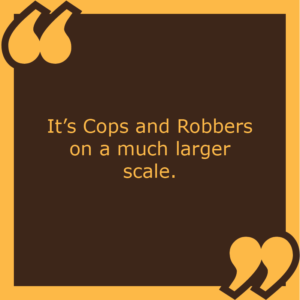 film like “Desolate” in this setting, can those schedule and budgetary restraints impact performance, and if so, how do you keep the stuff happening behind the scenes trickle into what you’re doing on-camera?
film like “Desolate” in this setting, can those schedule and budgetary restraints impact performance, and if so, how do you keep the stuff happening behind the scenes trickle into what you’re doing on-camera?
Brittain: It hasn’t really impacted performance, in my experience. It’s more just a group of people trying to build this puzzle together with limited resources – it makes the going a bit tougher but that’s part of the fun, I think.
TrunkSpace: For the viewer, the most memorable aspect of a project is the end result, but we’d imagine that for those involved it goes much deeper than that. What is something from your time working on “Desolate” that you’ll carry with you through the rest of your life and career?
Brittain: Just getting to film the movie with such a great group of people. We were brothers.
TrunkSpace: You’ve done a number of projects since calling wrap on “Desolate.” Is it odd going back and revisiting a character in a promotional aspect when the film is being released, and does it require having to plug back into the experience internally?
Brittain: Yeah, it’s pretty weird. It’s like looking at an old photo album. There’s some things that strike you with more fondness than you might have anticipated. It’s an emotional experience.
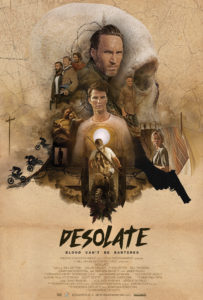 TrunkSpace: If someone came to you tomorrow and said, “Will, here is a blank check… go out and greenlight any project for yourself to star in,” what kind of project would you put into production and why?
TrunkSpace: If someone came to you tomorrow and said, “Will, here is a blank check… go out and greenlight any project for yourself to star in,” what kind of project would you put into production and why?
Brittain: I’d aim to put one of the films I’ve written into production. I’d love to be able to tell some of the stories I’d like to tell. That’s the dream.
TrunkSpace: Creative people, particularly those who seek perfection from themselves, can be very hard on their own work. Where are you hardest on yourself?
Brittain: I’m pretty hard on myself physically. I like to push my limits.
TrunkSpace: What has been the highlight of your career thus far?
Brittain: Forming friendships that last a lifetime.
TrunkSpace: Time machine question. If you could jump ahead 10 years and get a glimpse of what your career looks like a decade from now, would you take that journey? If not, why?
Brittain: Sure. That would be fun.
“Desolate” arrives in select theaters and on VOD today.
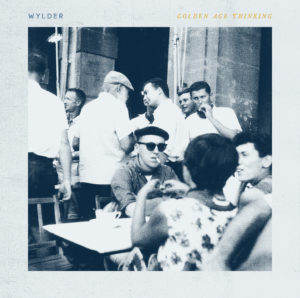 Artist: Wylder
Artist: Wylder
Album: Golden Age Thinking
Reason We’re Cranking It: There’s a lot of noise coming out of DC these days, but if you can look beyond the politics, “Golden Age Thinking” is a sound that’s literally music to our ears. Reminiscent of 90s era indie mainstays Guster and Wilco, Wylder blends sentimentality with substance in a way that both rewinds and fast forwards the genre at the same time.
What The Album Tells Us About Them: Folk and pop influences bubble to the surface in the quartet’s writing and they have the ability to build towards a moment, not only with individual tracks but with the album as a whole. If “Golden Age Thinking” were a balloon, it would become fully inflated by the midway point – “Winter” – and pop with punctuation by completion – “Right to My Head.” Pacing is an art form and Wylder has figured out the formula.
Track Stuck On Repeat: The vibe of “If I Love You” brings us back to our teen years when we contemplated less complicated matters of life in a way that gave them far more weight than they deserved. Young love was high stakes, and “If I Love You” goes all-in on our 90s nostalgia feels.
And that means…

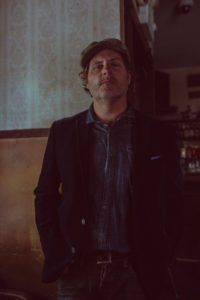
Nels Andrews has always been chasing stories, but it wasn’t until his early 20s that he began to tell those tales through music. Now on the cusp of releasing his latest album, “Pigeon & the Crow,” he’s reflecting on his own journey with us in ways that he never expected.
“Wow, this interview is a therapy session, this is great,” he said in an exclusive interview with TrunkSpace.
We recently sat down with Andrews to discuss releasing a record independently in 2019, the Bruce Springsteen effect, and how his music became married to a comic book.
TrunkSpace: You’ve had an interesting journey as a songwriter, particularly in how you first started traversing your artistic path. Do you feel like music came into your life at the right time for the right reasons? Would you be a different person today if music wasn’t your focus?
Andrews: I’ve always been chasing stories but didn’t have anywhere to put them down. Music had been in my life since elementary school plunking through the Beatles songbook, but creating music started when I was something of an early-20s hermit out in Taos, NM. Moving down to Albuquerque with those songs brought me to interact more with others, pulling on the extrovert in me. As that early 20s guy would point out, I’m a Leo.
If I hadn’t started writing and playing out I probably would’ve gone back to Taos and been a woodworker, which is something else I’d started. Or gone off chasing more stories.
TrunkSpace: How has expressing yourself through songwriting changed you as a person? Did it alter your way of thinking and how you looked at the world?
Andrews: When I was a kid I was diagnosed with all sorts of learning disorders. The stories and words are all floods in me but can be tricky to pull out in clear lines. Songwriting allows me to take the time to do that at my own pace.
I’ve also recently taken up photography, which keeps all the words out of the picture entirely, as it were.
TrunkSpace: You’re set to release your new album “Pigeon & the Crow” on August 9. What type of emotions do you juggle with as you gear up to release new material into the world?
Andrews: Wow, this interview is a therapy session, this is great.
Excitement, curiosity to see how this longstanding project of mine lands with the people who listen to it, also some panic and overwhelm –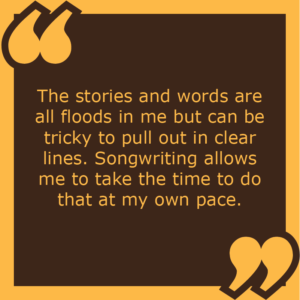 the giant set of organized and interlocking tasks which is independently releasing a record in 2019 is way more complicated than writing a baker’s dozen songs. Maybe the Dutch or the German have a word for “fear of unsold units” or its cousin, “dusty boxes of merch in the shed.” Or maybe this millennium’s compound word would have something to do with the professional (rather than the social) fear of not getting enough likes to be competitive in your market. That whole part is pretty awful.
the giant set of organized and interlocking tasks which is independently releasing a record in 2019 is way more complicated than writing a baker’s dozen songs. Maybe the Dutch or the German have a word for “fear of unsold units” or its cousin, “dusty boxes of merch in the shed.” Or maybe this millennium’s compound word would have something to do with the professional (rather than the social) fear of not getting enough likes to be competitive in your market. That whole part is pretty awful.
The creative songwriting part feels exhilarating, satisfying, toothy.
TrunkSpace: What would someone learn about you – both as a person and as an artist – in sitting down to listen to “Pigeon & the Crow” in its entirety?
Andrews: That I’m a middle-aged guy who has been watching and listening to the glances I’ve gotten of the world for a while, that maybe in another dimension I’m writing short stories. That I love Bruce Springsteen, that I’ve learned the importance of some sway, some rhythm.
TrunkSpace: From what we read, you’ve been working on the songs for this album over the course of the past few years. That’s a long time for someone in terms of personal growth and change. Is that time and how it impacted you reflective in the songwriting? Can you hear the differences between the Nels at the start of this journey and the Nels nearest to where we are today?
Andrews: Nels at the beginning was feeling a little done with the music business (never the music); we can see that in the ‘mid-careers themes’ in some of the songs. Nels nearest to now is somehow refreshed with wistful resolve.
But also the way I write the songs is very long and interwoven – many of the songs I started five years ago and returned to intermittently and finished one or two years ago, before recording them. So my then-self and my now-self all get to show up in the songs.
TrunkSpace: The album was recorded in a studio originally built for Sam Cooke. Can a space and the creative energy that lives within it impact an artist? Does the history of a studio trickle into what you’re doing in the present day?
Andrews: It certainly felt like it there; I felt like I was sleeping amongst the ghosts who had been there before. The bassist on the album, Sebastian Steinberg, knew a little about forensics and was able to determine that a suspicious stain on the wall was almost definitely not evidence of brutal murder. There were all sorts of groovy and mysterious vibes, hopefully some of which imbued into the rhythm section. And also just the folks who’ve recorded there since (Lord Huron, Soul Coughing)… it was just neat to be there where they’d done their thing.
TrunkSpace: There is a lot of wordplay in your songwriting… lines that stand out and stay with the listener. What is a line off of “Pigeon & the Crow” that you are particularly proud of and why?
Andrews: Well, there’s one that’s a double (triple?) reference, in “Memory Compass,” which is a song that takes place at the slow dawn ending of beach bonfire, there’s the line ‘in a baritone whisper, someone sang thunder road, caught your eye on the chorus, we’re all singing for the lonely alone’ – so that’s a reference to Bruce Springsteen who is referencing Roy Orbison. Not unlike a line earlier in that song, about mirrors in other mirrors.
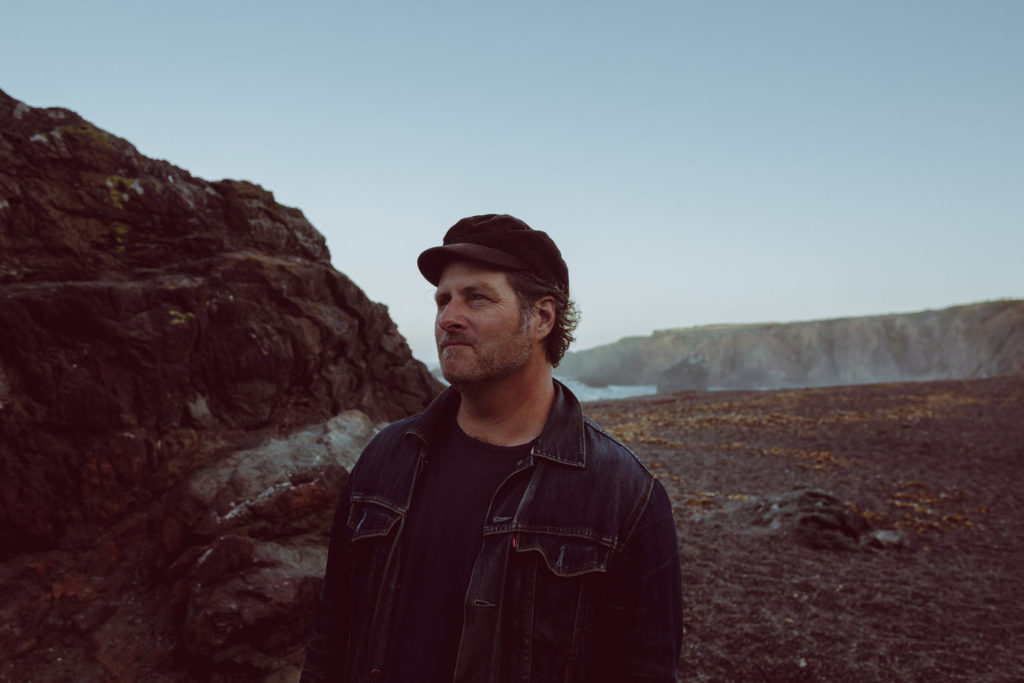
TrunkSpace: What are you most proud of with the album?
Andrews: The collaborative elements – whether it be with words/song/images that I put together with Mike Bencze (see answer below), or the international words and images ‘libraries and bookshops’ tour I’m looking forward to doing with UK singer-songwriter Jess Morgan, or just all of the collaboration with so many artists from around the world from so many musical backgrounds who played on the album.
TrunkSpace: Can you tell us a little bit about the comic book that you created as a companion piece to the album and how the concept came together?
Andrews: This song is what’s called a supernatural ballad – which is a song that’s telling a specific story involving something magical, a transformation. In this case, of a young girl who fed a crow who brought back small treasures for the girl (this really happened – see the news stories from the early aughts). In the song, the girl shapeshifts, as does the crow; it’s a love story. I was telling the story to my friend Mike, who is an illustrator, and he wanted to draw it. And thus our ‘graphic novella’ became. Also, it was fantastic because the collaboration was supported by the arts council wanting to support local artists, so we were also able to join a new part of the Santa Cruz arts community.
TrunkSpace: Time machine question. If you could jump ahead 10 years and get a glimpse of what your career looks like a decade from now, would you take that journey? If not, why?
Andrews: First I think there’s a difference between looking at where my career will be, and where my music will be. Those could be two different questions.
I wouldn’t want to look ahead because I want to stay curious and be in the moment. I don’t want to write songs for that future place. I want to be finding my way there, artistically, in the next set of things that present themselves. When you only have the answers to the long division problem… you can’t see the work.
“Pigeon & the Crow” is available August 9.
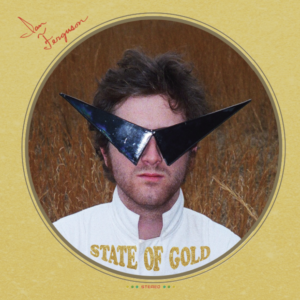 Artist: Ian Ferguson
Artist: Ian Ferguson
Album: State Of Gold
Reason We’re Cranking It: With what seems to be a countless number of boutique record labels focused on the quality of their releases and not the quantity, it’s easy for the DIYers to get overlooked in what feels like a modern day songwriting renaissance. But, like all good things, the cream rises to the top, and while “State of Gold” may never reach that status in terms of sales, the antiquated ways of valuing music – and experiencing it as a listener – do very little to stop an individual, in this case Ferguson, from bringing their own quality-over-quantity to the masses.
What The Album Tells Us About Him: Not only did Ferguson play all of the instruments that can be heard on the album, but he also recorded, engineered and mixed the entire collection on his own, capturing his artistic vision in a way that few artists are capable of. And while some songwriters may go this path to control their own destiny, for Ferguson it feels more like the music is in control and he is ushering it where it needs to go as opposed to the other way around.
Track Stuck On Repeat: Beatles fans will feel the Sgt. Pepper’s pop of “Deep Beneath the Waves,” which like the name suggests, flows in on a current of psychedelic movement that picks you up in one place and drops you off in an entirely different one.
And that means…

 Artist: Defoe
Artist: Defoe
Socials: Facebook/Instagram/Twitter
Hometown: Los Angeles, CA
TrunkSpace: You released your debut album, “Too Soon To Cry,” on July 1. What emotions do you juggle with as you prepare to release songs into the world?
Defoe: I’ve put so much love and care into each millisecond of every song I honestly feel relieved to finally put something out that is mine and while caring for my two year old. I’m super proud of it like an audio art sculpture. I say bring on the positive and negative criticism, it will not change how I feel about this whole wonderful process.
TrunkSpace: As an artist, are you someone who has a hard time letting go of the art that you create? Is it difficult to put so much of yourself into something and then once released, have so much how it finds and connects with an audience be out of your hands?
Defoe: It used to be. I’ve been making songs in private for the past 15 years. I guess I never had the confidence, and at the time I felt exposed and vulnerable. Now that I’m older and a mother, my views on creating and sharing with the world has drastically changed. My husband pushed me for years to go back to working on my own music and I strongly resisted with a lot of shame. Thanks to him pushing me so hard by building back my confidence and the friends and family in my life encouraging me, I dedicated a year to creating and finishing my first album.
TrunkSpace: For first-time listeners, what would they learn about you as a person and as an artist in sitting down to listen to “Too Soon To Cry” in its entirety?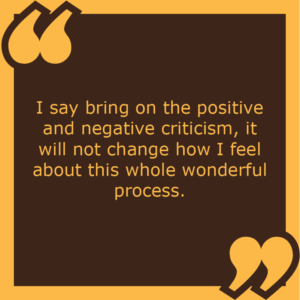
Defoe: That I’m a dreamer. I love creating landscapes and visual moods in all my songs. I treat every song like a different movie set and let the actors (the notes) have the freedom to take over the listeners’ hearts. I’m not out to make cool music or fit into a genre – I’m into making every moment to feel right and vibey. So they will definitely know that by how different every track is on the record.
TrunkSpace: Music has been a part of your life since you were very young. What would 9-year-old Defoe – the girl who stepped into the studio for the first time – think about “Too Soon To Cry” and your journey as an artist to date?
Defoe: I think 9-year-old me would think I was a magical princess from a secret place far away. I don’t think she will focus on the struggle and the pain during my journey, but she will see amazing opportunities I’ve had and be super excited to grow up into a woman who makes such beautiful music.
TrunkSpace: Early in your journey you were being groomed for a career in country music. Was it inevitable that you stray from that genre path? When did you realize that it wasn’t the type of music you were meant to be writing and performing?
Defoe: When I was younger I was taken under the wing of a talented group of people that wanted to create a new young pop/country crossover artist. Though I love all kinds of music, I was not particularly favoring country music at that time, but I was able to sing it. I worked with legendary musicians and amazing people in the industry. At that time I didn’t write any of the songs or give any input creatively – I just didn’t have the confidence or self awareness yet. At the end of the day I felt like I had to fake a whole other identity to become an artist I wasn’t, so I made the painful decision to walk away before releasing. It taught me that I was not into the side of the manufactured music business and taught me the process in which records were made, and I also made life long valuable friendships. So, I think that’s why I insist on working on every track myself. It may be a bit extra work on my part, but at the end of the day I’m happy with all my end products.
TrunkSpace: You grew up with music all around you. Do you think that your passion for music comes from the creative nurturing of your mother and father? Would you be writing, recording and performing today if it weren’t for your upbringing?
Defoe: My parents gave me the most nurturing upbringing for a creative kid by giving me freedom. Freedom to choose my own weird outfits even if they were mismatched. Freedom to act like a weirdo around the house. I was a late talker – didn’t start speaking 3 1/2 to 4 years old. They watched what I gravitated to and saw I liked to sing so they bought me a microphone and a mini piano at 3 years old. My mom surrounded me with movies with amazing movie scores and my father played golden oldies radio. What a perfect storm for what was to come.
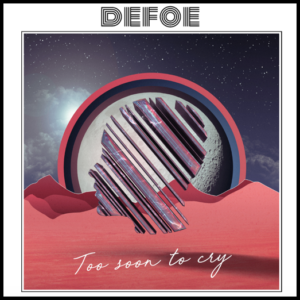 TrunkSpace: You have worked behind the scenes with other artists over the years. How has working with other creatives inspired your own creative path?
TrunkSpace: You have worked behind the scenes with other artists over the years. How has working with other creatives inspired your own creative path?
Defoe: I love giving the artist confidence in themselves by showing them cool things their voice CAN do as opposed to focusing on what their voice cannot. I love working on different genres and working in constraints of each genre. I learn so many skills and new things from each process. I usually can’t wait to try it on my own stuff. I also learn where my weaknesses are. By identifying some of my weak points (usually drums), I’ve learned to let go of my pride in that area and bring other talented people to help me. Why let a song suffer because I insist on doing everything myself?
TrunkSpace: Where are you hardest on yourself as an artist?
Defoe: Knowing when to stop. I tend to be an audio maximalist. (Laughter) Some times knowing when a song is finished can be tough. I want to keep nourishing it.
TrunkSpace: When all is said and done and you hang up your instruments, what do you hope to be remembered for? What do you want your legacy to be?
Defoe: That no matter your age and how low you feel on your luck, you always chance to start over and do what makes you happy. A busy mother can still achieve her dreams and create mind-blowing art. People with anxiety and depression can find a way out and use their experiences to create and inspire others through their story. Feeling so blessed with the gift to create – I intend creating art for as long as I’m alive.
TrunkSpace: Time machine question. If you could jump ahead 10 years and get a glimpse of what your career looks like a decade from now, would you take that journey? If not, why?
Defoe: Easy. No. Definitely not. Life is about the mysteries that are around each corner and facing each challenge. I would lose the awe of life and see my world as bleak. Losing the will to fight for possible achievements sounds like a recipe for disaster. I’ll bore in the journey instead of embracing it. The fight is so important for us as human beings. I know that’s dramatic, but that’s how I feel.
“To Soon To Cry” is available now.

Coming from the daily grind of network soap operas, McKenna Roberts learned what it takes to be a working actress at a very early age. Still only 11, she has since graduated from her “The Young and the Restless” roots to become Dwayne Johnson’s daughter in “Skyscraper” and the 10-year-old version of Zendaya’s character Rue from the new HBO series “Euphoria.” Those are both big roles to fill, and she has gone on to do so with a level of confidence that reaches well beyond her physical age.
We recently sat down with Roberts to discuss on-set lessons, the challenges of taking on characters, and the type of reality show she would one day like to appear on.
TrunkSpace: From Dwayne Johnson’s daughter in “Skyscraper” to the younger version of Zendaya’s Rue in the new HBO series “Euphoria,” you are certainly surrounding yourself with successful talent early in your career. Are you looking at each project you work on as just as much of an education as you are a job?
Roberts: Absolutely! It’s been a tremendous learning experience. Every job I’ve worked on, I’ve taken something from it and put it into other roles and auditions.
TrunkSpace: You spent a number of years working on “The Young and the Restless.” Soap operas are known for their breakneck production schedules, and in a way, that must be a great boot camp to learn from. What is a lesson that you took from your time on the series that you’ve carried with you through the rest of your career thus far?
Roberts: I learned that you need to be on your game – meaning, making sure you know your lines, paying attention to what camera is taping, and at the same time, you want your performance to be on point because they move very fast.
TrunkSpace: As mentioned, “Euphoria” will air on HBO, which is a network that actors of all ages are vying to do work with.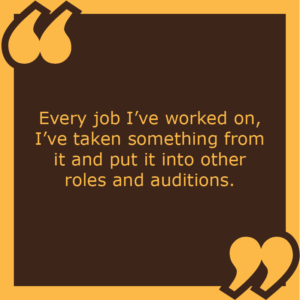 When you step away and look at your career from an outside perspective, do you feel like each opportunity has led to the next opportunity, and if so, where do you hope to go from here?
When you step away and look at your career from an outside perspective, do you feel like each opportunity has led to the next opportunity, and if so, where do you hope to go from here?
Roberts: Yes, I do think that each opportunity in my career has and probably will continue to lead me to something even greater! I loved that I can add HBO to my resume.
TrunkSpace: In “Euphoria” you play a young Rue. Did you work with Zendaya to pick up the little details of the character – the physical stuff – so that when the audience sees her at 10-years-old, the who of Rue lines up with the where she came from?
Roberts: No we didn’t do that, and I think it was because the beginning experiences Young Rue went through were on a much different level than the Older Rue. And as she got older, her life went into a much darker place.
TrunkSpace: As a performer, is there more pressure involved bringing a character to life when, within the same series, someone else is also breathing life into the same character? Does it become a bit of a collaboration in that regard?
Roberts: I really didn’t feel any pressure because that’s what I’m used to doing with every character I have played in my career. It was just more of a challenge if anything, but I was happy with my work and I wanted to make sure the director was too.
TrunkSpace: What are you most proud of about your time spent on the series?
Roberts: I felt like my role was challenging and I thought I did a good job with my character, and I was just super happy I got to play a younger character that Zendaya was playing.
TrunkSpace: Aside from your acting work, you’re also a model. Do you view both as two separate careers, or extensions of the same career?
Roberts: I do see them both as separate careers for me. But a lot has changed since I started modeling and there are a lot of opportunities that can be tied into what’s going on in my acting career if the timing is right.
TrunkSpace: From what we understand, you like to bake/cook in your spare time. What is a food-related show that you wouldn’t mind being a contestant on and why?
Roberts: Well, the funny thing is that a few years back, I actually auditioned to be on a food-related show called “Master Chef Junior.” I auditioned for it twice and got really close one of the times. So, being on a show like that, or maybe a celebrity baking challenge show, would be really cool.

TrunkSpace: What has been the highlight of your career thus far?
Roberts: The highlight of my career has definitely been working on “Skyscraper” with some incredible people in the industry like director Rawson Marshall Thurber, Neve Campbell, Dwayne Johnson and many others.
TrunkSpace: Time machine question. If you could jump ahead 10 years and get a glimpse of what your career looks like a decade from now, would you take that journey? If not, why?
Roberts: Even though that sounds super cool, I wouldn’t want to time travel to see what my career looks like because I think it would ruin the fun and excitement of what’s to come for me – and I’m happy with how things are going for me now!
“Euphoria” airs Sundays on HBO.




